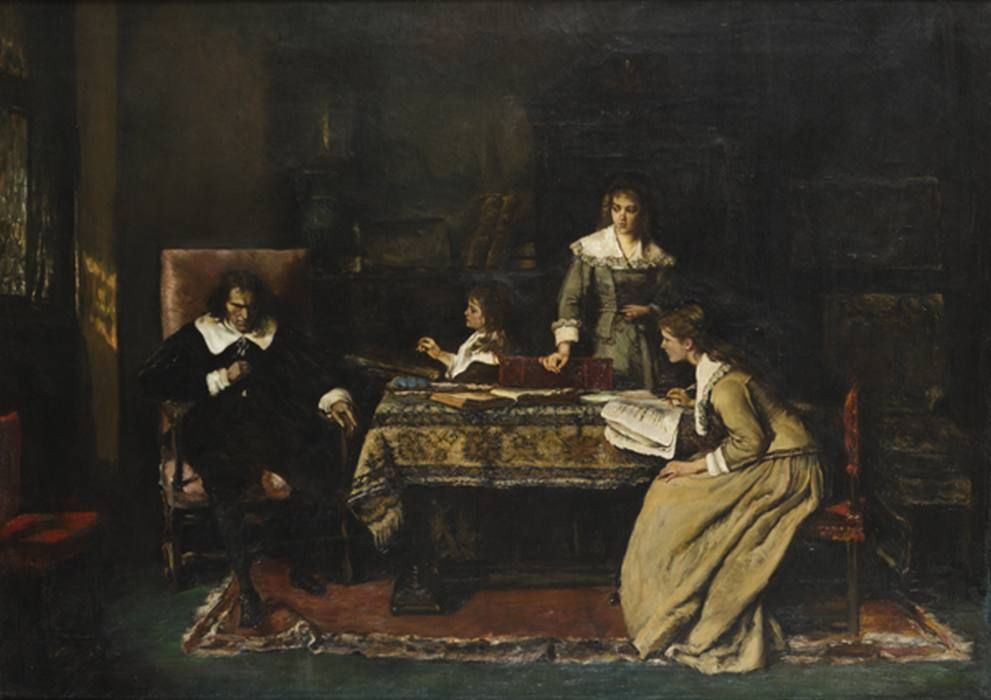Friday
I report today on a vivid dream that visited me Wednesday night. In it, I was working my way up an icy hill to retrieve my son Toby, who in the dream was a child visiting friends (he’s now an adult). When I got to the house late, I saw that he was sleeping in the hallway, but he awoke when I entered and gave me a joyous smile. The reason: lying next to him, also asleep, was his beloved older brother Justin, who died 22 years ago.
Then Justin too awoke and smiled his characteristic smile. Tall and lanky with blond hair that flopped over his eyes, he assured me he was back when I told him, “I thought we’d lost you.” As I knelt to hug him, however, I woke up.
I haven’t cried about Justin in two decades but, after telling Julia about the dream, I cried. I also recalled John Milton’s “Sonnet 23,” where he describes a similar dream.
In Milton’s case, he is dreaming of Katherine Woodcock, his second wife who died from childbirth complications after they had been married for only two years. Invoking the story of Heracles (“Jove’s great son”) journeying to Hades to rescue Admetus’s wife Alcestis, Milton says that, for a moment, he thought that Woodcock had been similarly restored to him. Although “her face was veiled,” Milton writes,
yet to my fancied sight
Love, sweetness, goodness in her person shined
So clear, as in no face with more delight.
That’s how it was with Justin as well. In his expression, I read pure delight. He always was an expressive child, and in my dream good humor radiated off of him.
And then, like Milton in the poem, I woke up:
But O, as to embrace me she inclined,
I waked, she fled, and day brought back my night.
“Night” works double here as Milton was blind by this time. In fact, he never physically saw his wife. But he saw her in his dream—in darkness—before awaking to what for him was eternal night:
Methought I saw my late espoused Saint
Brought to me like Alcestis from the grave,
Whom Jove’s great son to her glad husband gave,
Rescued from death by force though pale and faint.
Mine as whom washed from spot of childbed taint
Purification in the old law did save,
And such as yet once more I trust to have
Full sight of her in heaven without restraint,
Came vested all in white, pure as her mind:
Her face was veiled, yet to my fancied sight
Love, sweetness, goodness in her person shined
So clear, as in no face with more delight.
But O, as to embrace me she inclined,
I waked, she fled, and day brought back my night.
I find myself wondering whether this dream has been triggered by grief for my recently departed mother. She adored Justin (and he her) and, as I was talking to her in her final hours, I told her that she’d be seeing Justin soon. Maybe the dream was to reassure me that I wasn’t feeding her an empty wish fulfillment.
Sometimes poetry’s gift to us is letting us know that others have felt what we are feeling and experienced what we are experiencing. I certainly found that to be true after Justin died, when I was comforted by the fact (so poems like Mary Oliver’s “Lost Children” and Tennyson’s “In Memoriam” let me know) that I was not alone in my suffering. Milton’s ability to articulate his heartbreak and to find beauty in the midst of it cushions the rest of us.
Poetry, in short, helps us through unbearable pain.


